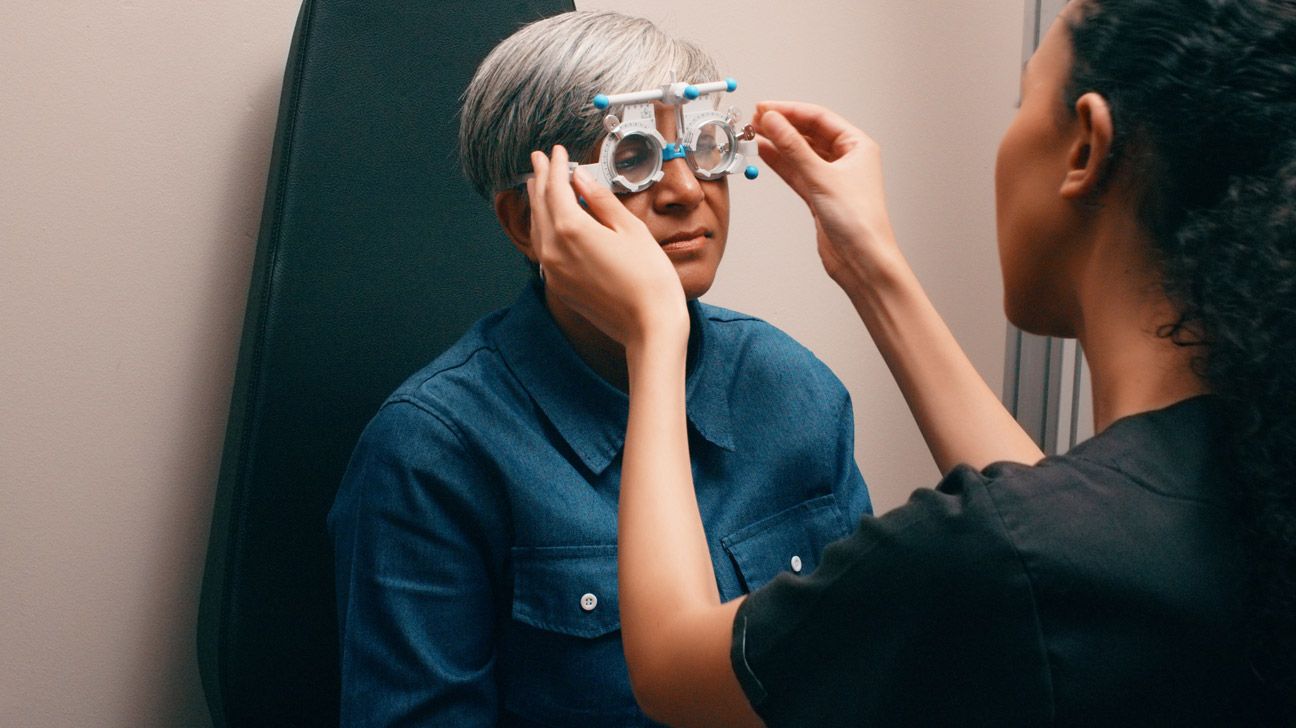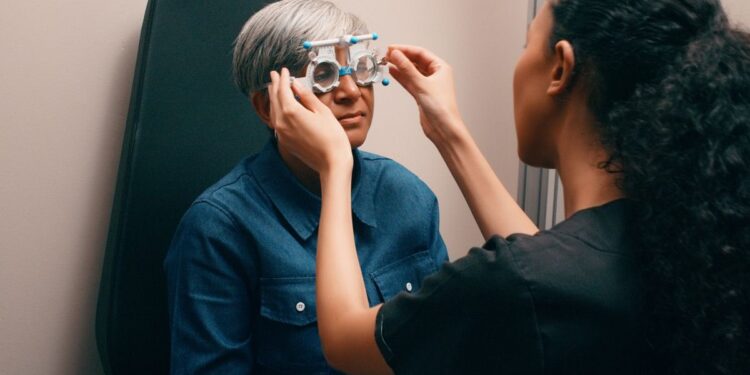
- Studies have linked GLP-1 medications to various eye conditions, some of which may lead to vision loss.
- Despite these findings, a clear link has yet to be established, and much of the evidence remains inconsistent.
- People should be aware of potential eye disease and blindness risks when discussing a GLP-1 with their doctor.
The debate over whether GLP-1 medications raise the risk of eye conditions that could lead to vision loss continues.
Scientists have been closely studying this association as more people turn to these widely prescribed drugs for weight management.
Some studies have suggested a link, but the overall evidence has been inconsistent. However, when a potential side effect becomes as serious as vision loss or blindness, even a remote possibility is worth investigating.
GLP-1 drugs are a class of medications used to treat obesity and type 2 diabetes that include semaglutide (Ozempic, Wegovy) and tirzepatide (Mounjaro, Zepbound). They work by mimicking naturally occurring hormones that help regulate blood sugar, promote satiety, and reduce appetite.
While GLP-1s are generally well tolerated and offer numerous health benefits — from weight loss and better glucose control to a lower risk of cardiovascular disease — research suggests they could increase the risk of certain serious eye conditions.
The risk of developing these conditions is relatively low. However, they are serious and should be factored into the risk–benefit discussion when considering GLP-1 therapy with a doctor.
As a flurry of new research offers a clearer picture of how GLP-1 drugs may affect eye health, Healthline spoke with experts to help break down the findings.
Three new studies investigated the link between GLP-1s and eye disease, but each employed distinct methods and arrived at different conclusions.
A new study compared the effects of semaglutide or tirzepatide with other antidiabetic medications — such as insulin and metformin — on optic nerve conditions, including NAION, in patients with type 2 diabetes.
The retrospective cohort study, published on August 11 in
Over two years of follow-up, those taking a GLP-1 had higher rates of NAION and other optic nerve conditions than those in the comparison group.
There were 93 patients with other optic nerve disorders in the semaglutide or tirzepatide group, and 54 patients with these disorders in the comparison group. The study did not specify the types of other optic nerve disorders.
“Newer GLP-1RAs have lots of benefits. This study provides evidence of their potential risks. For each patient, the risk-benefit tradeoff critically depends on a patient’s clinical characteristics and their preferences and clinicians’ recommendations,” senior study author Rong Xu, PhD, professor and director of the Center for AI in Drug Discovery at Case Western Reserve University, told Healthline.
A separate
In a large cohort of patients with type 2 diabetes, researchers found that GLP-1 use was not associated with a higher incidence of NAION but was linked to another eye condition: diabetic retinopathy.
During a two-year follow-up, 5,037 patients taking a GLP-1 developed diabetic retinopathy, compared with 4,938 who were not — a 7% increased risk.
In a twist, the study found that although there was a small increase in diabetic retinopathy, GLP-1 use appeared to protect against the condition’s progression and sight-threatening complications.
A subgroup of patients in the study had pre-existing diabetic retinopathy. Those who took a GLP-1 had a lower risk of complications, including progression to proliferative diabetic retinopathy, diabetic macular edema, vitreous hemorrhage, and neovascular glaucoma. They were also less likely to require medical, surgical, or laser treatments for their eyes.
Most notably, GLP-1 use was associated with a significantly lower incidence of blindness from any cause.
Another study — a meta-analysis and review of 78 trials involving more than 73,000 participants — concluded that semaglutide was associated with an increased incidence of NAION but emphasized that evidence for a causal link remains inconclusive.
The review, published on August 14 in
It’s important to note that all three studies can only identify correlations and cannot establish that taking a GLP-1 causes these eye disorders.
Studies so far have also focused almost exclusively on patients with type 2 diabetes, so it’s unclear what effect GLP-1s have on eye conditions in individuals taking them for weight loss.
If you’re having trouble making sense of what these conflicting findings mean — especially if you already take a GLP-1 or are considering one — you’re not alone.
Here’s a quick summary on GLP-1s and various eye conditions, and what experts have to say about them:
NAION
NAION causes sudden blindness in one eye, usually after waking, that is caused by a lack of blood flow to the optic nerve. The condition is elusive, and not well understood. The condition is serious, but despite an apparent increased incidence among patients taking GLP-1s, the condition is still uncommon.
“NAION is rare in general,” said Xu. “For patients with high risk of developing NAION (e.g., those with diabetes, hypertension) who are taking GLP-1RAs, ophthalmologists may increase vigilance,” she said.
Linda Lam, MD, MBA, an ophthalmologist with Keck Medicine of USC, who wasn’t involved in the research, tells Healthline that it’s too early to make a “definitive connection” between NAION and GLP-1s.
“To make a correlation that GLP-1s cause NAION would be a big leap,” she said.
Diabetic retinopathy
Diabetic retinopathy is a complication of type 1 and type 2 diabetes that may lead to vision loss. It is the most common cause of preventable blindness in the United States.
“It’s better to be cautious and protective with vision. So, if a patient has started on a GLP-1 and they already have some diabetic retinopathy, I would just have them come in sooner to see their eye care provider,” said Lam.
“Wet” age-related macular degeneration
A recent study published in June found that patients with type 2 diabetes who took GLP-1s were more than twice as likely to develop wet AMD as those who did not.
Researchers also identified a dose response, meaning that the longer the patients took a GLP-1, the more likely they were to develop the condition.
However, there still needs to be more research to substantiate this link.
“We need to have a lot more studies before we can make these cause and effect determinations. But, anyone who has neovascular AMD and is on a GLP-1 needs to be monitored more closely,” said Lam.
The bottom line: GLP-1s have many health benefits, and while there is some evidence to support an association between them and serious eye conditions, that link should not be overstated, and must be considered within the greater context of your individual health.
Patients with diabetes should get regular eye exams, regardless of whether they are taking a GLP-1, but taking the medication may be one more reason to schedule an exam.
“GLP-1s have potentially good long-term effects for long-term health in patients with diabetes or obesity. But doctors should be much more cautious and aware of visual complications while they’re on these medications, especially when their glycemic numbers go down rapidly. The threshold for when to see your eye care provider or retina specialist should be lower,” Lam said.
Source link : https://www.healthline.com/health-news/glp-1-drugs-eye-health-research
Author :
Publish date : 2025-08-15 09:39:44
Copyright for syndicated content belongs to the linked Source.









